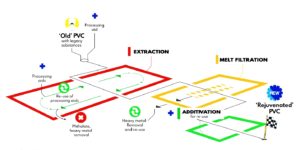A new technique to remove hazardous substances from PVC.
PVC is one of the most widely used polymers in the world thanks to its versatile properties: light, strong, fire resistant, excellently insulating and low gas permeability. Furthermore, PVC products are durable; their life-span can range from 30 to even 100 years in the case of cables, pipes and window profiles. However, certain additives in the current PVC waste, which were made decades ago in compliance with the regulations at that time, are now considered as hazardous and have become subject to EU regulations restrictions. The most common hazardous additives present in PVC waste are phthalate based plasticisers which were added to improve flexibility, and heavy metals, mainly lead based stabilizers, added to improve the thermal stability of the PVC material. However, currently no commercially viable methods exist to remove these substances from PVC. Therefore, there is an urgent need for a commercially viable method capable of removing these additives from recycled PVC.

The objective of the REMADYL project is to rejuvenate the recycled PVC by removing the hazardous substances and replacing them by harmless environmentally friendly alternatives. REMADYL steps up to the challenge to develop a commercially viable technique for the detection and extraction of these additives from both soft and hard PVC waste. REMADYL will develop a new multi-step continuous extrusion process in combination with melt filtration to remove the hazardous additives.
The REMADYL project, funded by the Horizon 2020 Framework Programme for Research & Innovation, will contribute to the development of the EU Circular Economy Package.
The main role of Promolding in the REMADYL project is to evaluate the re-use of recycled soft PVC in the injection molding process. The processing stability and final mechanical properties will be compared to virgin commercial PVC compounds.

